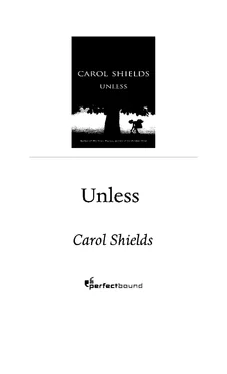Carol Shields - Unless
Здесь есть возможность читать онлайн «Carol Shields - Unless» — ознакомительный отрывок электронной книги совершенно бесплатно, а после прочтения отрывка купить полную версию. В некоторых случаях можно слушать аудио, скачать через торрент в формате fb2 и присутствует краткое содержание. Жанр: Современная проза, на английском языке. Описание произведения, (предисловие) а так же отзывы посетителей доступны на портале библиотеки ЛибКат.
- Название:Unless
- Автор:
- Жанр:
- Год:неизвестен
- ISBN:нет данных
- Рейтинг книги:4 / 5. Голосов: 1
-
Избранное:Добавить в избранное
- Отзывы:
-
Ваша оценка:
- 80
- 1
- 2
- 3
- 4
- 5
Unless: краткое содержание, описание и аннотация
Предлагаем к чтению аннотацию, описание, краткое содержание или предисловие (зависит от того, что написал сам автор книги «Unless»). Если вы не нашли необходимую информацию о книге — напишите в комментариях, мы постараемся отыскать её.
Unless — читать онлайн ознакомительный отрывок
Ниже представлен текст книги, разбитый по страницам. Система сохранения места последней прочитанной страницы, позволяет с удобством читать онлайн бесплатно книгу «Unless», без необходимости каждый раз заново искать на чём Вы остановились. Поставьте закладку, и сможете в любой момент перейти на страницу, на которой закончили чтение.
Интервал:
Закладка:
Me glad? The least little signal will gladden my heart these days. Today she looked not quite at me, and nodded. Another wave of gladness struck. I allow myself only one such glimpse a week, since she’s made it clear she doesn’t want to see us.
It is like watching her through plate glass. All week I will draw expensively on this brief moment of voyeurism, at the same time trying to blot it out with images of Norah on her bicycle; Norah sitting at the kitchen table studying for exams; Norah reaching for her green raincoat; Norah trying on new school shoes; Norah sleeping, safe.
After a while I went to have my eyebrows arched and tinted at Sylvia’s, which calls itself a “spirit spa,” meaning, it seemed, that while Madame Sylvia swiped at my brow with a little paintbrush, she murmured and sang into my ear. It was now nine-thirty in the morning and I lay on a narrow table in a tiny white room. “You are at the age when you must protect the fine skin around the eyes,” she warned. “A woman’s face falls, it is inevitable, but the eyes go on and on, giving light. You will be eighty, ninety, and your eyes will still charm.”
She knows nothing about my life. I’ve never been here before and have never thought of having an eyebrow tint. I have perfectly decent eyebrows, nicely shaped and regular, but I did look into a mirror a week or so ago and noticed that the small hairs at the outside corners were coming in grey. There was a little grey at the temples too, but nothing to be surprised about, not for a woman whose forty-fourth birthday is approaching, not for a woman who has never even thought of herself as possessing “temples,” such august body parts.
“Are you by any chance a Gemini?” Madame Sylvia asked intimately. Swish went the paintbrush. She stopped, peered at me closely, then swished again, a deft little stroke.
“No,” I said, ashamed to acknowledge the astrological universe. “My birthday’s in September. Next week, in fact.”
“I can tell, yes.” She had a touch of the harridan in her voice. “I can always tell.”
What could she tell?
“Twenty-four dollars,” she said. “Let me give you my card. For next time.”
Presumptuous, but yes, there will be a next time. I calculated quickly. My face would make it through the next few weeks, but by November I will probably be back in Madame Sylvia’s hushed white cell. I may well become a regular. Eyebrows, lashes, full facials, neck massage. I have led a reflective life, a life of thought, a writer, a translator, but all this is about to change. The delicate skin around my eyes was demanding attention. Has Tom noticed? I don’t think so. Christine and Natalie don’t really look at me in that way; they just see this watercolour blob that means mother, which is rather how I see myself.
“A woman’s charm is with her for life,” Madame Sylvia said, “but you must pay attention.”
No, I thought an hour later, no. I’m sorry, but I have no plans to be charming on a regular basis. Anyone can be charming. It’s really a cheap trick, mere charm, so astonishingly easy to perform, screwing up your face into sunbeams, and spewing them forth. The calculated lift of the wrist, chin up, thumb and fore-finger brought together to form a little feminine loop, that trick of pretending to sit on a little glass chair, that concentration of radiance, l’esprit; little sprinkles of it everywhere, misting the air like bargain scent. Ingenue spritz, Emma Allen calls it.
I know that cheapness so intimately — the grainy, sugary, persevering way charm enters a fresh mouth and rubs against the molars, sticking there in soft wads, promoting mouth ulcers or whatever it is that’s the metaphoric projection of self-hatred. Of all the social virtues, charm is, in the end, the most unrewarding. And compared to goodness, real goodness, or the unmovable self-abnegation my daughter Norah practises, charm is nothing but crumpled tissue paper, soiled from previous use.
Sincerity? No. Sincerity’s over. Sincerity’s lost whatever edge it had. It’s fine, fine matter but wasted on the press, who all grew up post-Holocaust, devoted readers of Mad Magazine, and wouldn’t recognize a bar of willed innocence if it came wrapped in foil.
Nor will I ever again be pointlessly, endlessly polite. I got over that two years ago when I did my author tour. It seems I’ve lost, like a stream of pebbles leaving my hand, the kind of endurance that professional courtesy demands: suck in your breath, let your face go numb, listen to the interviewer’s questions, register optimally, let your breath out, evaluate the feelings of those who depend on you (agent, publisher, editor, that nice Sheila person who does publicity, and of course Danielle Westerman), and perform again and again like the tuned-up athlete you are, the fit physical specimen that each new book demands, then move on to the next task.
Mrs. Winters, who has just translated The Middle Years, the unfolding memoir of Holocaust survivor Danielle Westerman, is a woman of grace and charm, whose thick brown hair is arranged into a bun. Putting down her coffee cup, she shrugs off her beige raincoat and. .
I’ve entered early middle age now and I have a nineteen-year-old daughter who lives on the street. I no longer require a reputation for charm, those saving lilac shadows and contours.
Maybe I never did. I won’t — not now — tuck the ends of my sentences into little licks of favour, and the next time a journalist pins me down with a personal question, trolling for information — Tell me, Mrs. Winters, how are you able to balance your family and professional life? — I will stare back hard with my newly practised stare. How do I balance my life? Tinted eyebrows up. Just what kind of inquiry is this? Wouldn’t you prefer, Mrs.
Winters, to pursue you own writing rather than translate Dr. Westerman’s work? Please, not that again. How did you and your husband meet? What does he think of your writing?
I will in the future address my interviewer directly, and say with firmness: “This interview is over.” There is nothing to lose. Rude and difficult people are more likely to be taken seriously. Curmudgeons are positively adored. I’ve noticed this. Even the fascinatingly unknowable earn respect.
And when I read in the paper tomorrow that “Mrs. Winters looked all of her forty-three years” and that “Mrs. Winters with her familiar overbite was reluctant to talk about her work schedule,” I will want to phone the editor and complain bitterly. This from the pen of a small, unattractive man, almost entirely lipless beneath a bony, domineering nose, sweating with minor ambition, head tilted like something carved out of yellow wax.
He interviewed me in a cappuccino bar in mid-Toronto. A chilly, stooped, round-headed man in his thirties or forties — it was hard to tell — slow to smile, pathetically in need of human attention, thinking his superior thoughts. Fluff on his shoulders begged to be picked off. I, on the other hand, was wearing a soft jade jacket of cashmere lined with silk, which represented a rare splurge on my part, but I could be sure this man would overlook this garment with its crystal buttons and mandarin collar and concentrate instead on my drab raincoat, beige, and not quite pristine at the cuffs. In print he will be certain to refer to my chignon as a bun. It’s taken me years to learn to do a glossy little chignon — I can get my hair brushed back and securely pinned up each morning in a mere two and a half minutes and I consider my coiffure one of my major life accomplishments. I really mean this.
Sheila from publicity had filled me in before the interview, and I felt the information packet hovering; what to do with it? This young/youngish man was the newly appointed books columnist at Booktimes. He was well known for holding pious opinions about the literature of the Great North, about his own role as advocate of a diverse new outpouring of Canadian voices, the post-colonial cry of blaming anguish. The stream of current fiction about middle-class people living in cities was diluting the authentic national voice that rose from the landscape itself and —
Читать дальшеИнтервал:
Закладка:
Похожие книги на «Unless»
Представляем Вашему вниманию похожие книги на «Unless» списком для выбора. Мы отобрали схожую по названию и смыслу литературу в надежде предоставить читателям больше вариантов отыскать новые, интересные, ещё непрочитанные произведения.
Обсуждение, отзывы о книге «Unless» и просто собственные мнения читателей. Оставьте ваши комментарии, напишите, что Вы думаете о произведении, его смысле или главных героях. Укажите что конкретно понравилось, а что нет, и почему Вы так считаете.












